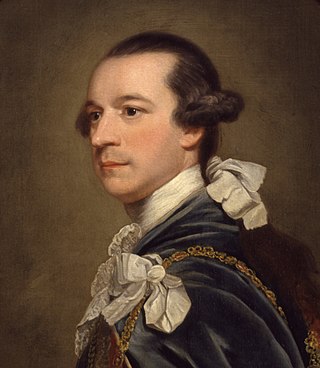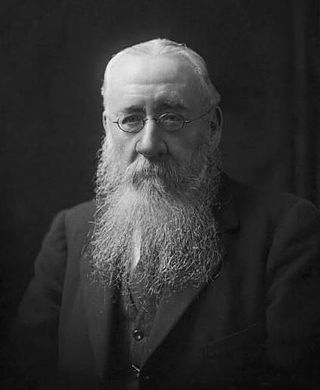
Thomas Babington Macaulay, 1st Baron Macaulay, was a British historian and Whig politician, who served as the Secretary at War between 1839 and 1841, and as the Paymaster-General between 1846 and 1848.

Charles Watson-Wentworth, 2nd Marquess of Rockingham, was a British Whig statesman and magnate, most notable for his two terms as Prime Minister of Great Britain. He became the patron of many Whigs, known as the Rockingham Whigs, and served as a leading Whig grandee. He served in only two high offices during his lifetime but was nonetheless very influential during his one and a half years of service.

Sir James Mackintosh FRS FRSE was a Scottish jurist, Whig politician and Whig historian. His studies and sympathies embraced many interests. He was trained as a doctor and barrister, and worked also as a journalist, judge, administrator, professor, philosopher and politician.

Henry Hallam was an English historian. Educated at Eton and Christ Church, Oxford, he practised as a barrister on the Oxford circuit for some years before turning to history. His major works were View of the State of Europe during the Middle Ages (1818), The Constitutional History of England (1827), and Introduction to the Literature of Europe, in the Fifteenth, Sixteenth and Seventeenth Centuries (1837). Although he took no part in politics himself, he was well acquainted with the band of authors and politicians who led the Whig party. In an 1828 review of Constitutional History, Robert Southey claimed that the work was biased in favour of the Whigs.

George Macaulay Trevelyan was a British historian and academic. He was a Fellow of Trinity College, Cambridge, from 1898 to 1903. He then spent more than twenty years as a full-time author. He returned to the University of Cambridge and was Regius Professor of History from 1927 to 1943. He served as Master of Trinity College from 1940 to 1951. In retirement, he was Chancellor of Durham University.

Edward George Geoffrey Smith-Stanley, 14th Earl of Derby,, known as Lord Stanley from 1834 to 1851, was a British statesman and Conservative politician who served three times as Prime Minister of the United Kingdom. To date, he is the longest-serving leader of the Conservative Party. He is one of only four British prime ministers to have three or more separate periods in office. However, his ministries each lasted less than two years and totalled three years and 280 days. Derby introduced the state education system in Ireland, and reformed Parliament.

Charles Grey, 2nd Earl Grey, known as Viscount Howick between 1806 and 1807, was a British Whig politician who served as Prime Minister of the United Kingdom from 1830 to 1834. He was a descendent of the House of Grey and the namesake of Earl Grey tea.
Henry Reeve was an English men of letters.

George Edward Bateman Saintsbury, FBA, was an English critic, literary historian, editor, teacher, and wine connoisseur. He is regarded as a highly influential critic of the late 19th and early 20th century.

Zachary Macaulay was a Scottish statistician and abolitionist who was a founder of London University and of the Society for the Suppression of Vice, and a Governor of British Sierra Leone.

Baden Powell, MA FRS FRGS was an English mathematician and Church of England priest. He held the Savilian Chair of Geometry at the University of Oxford from 1827 to 1860. Powell was a prominent liberal theologian who put forward advanced ideas about evolution.
George Nugent-Grenville, 2nd Baron Nugent of Carlanstown, GCMG, was an Irish politician.
Francis Thackeray (1793–1842) was a Church of England clergyman and author.

John Allen was a prominent eighteenth and nineteenth century political and historical writer, and Master of the College of God's Gift in Dulwich. More than one street in Kensington, London, is named after him.

Critical and Miscellaneous Essays is the title of a collection of reprinted reviews and other magazine pieces by the Scottish essayist, historian and philosopher Thomas Carlyle. Along with Sartor Resartus and The French Revolution it was one of the books that made his name. Its subject matter ranges from literary criticism to biography, history and social commentary. These essays have been described as "Intriguing in their own right as specimens of graphic and original nonfiction prose…indispensable for understanding the development of Carlyle's mind and literary career", and the scholar Angus Ross has noted that the review-form displays in the highest degree Carlyle's "discursiveness, allusiveness, argumentativeness, and his sense of playing the prophet's part."
A History of the Early Part of the Reign of James II (1808) is a history of England during the first year of James II's reign (1685), written by the Whig MP Charles James Fox. It was left unfinished at his death in 1806 and was not published until 1808.
John Paget (1811–1898) was an English barrister, police magistrate and author.
Colonel Thomas Moody was a British geopolitical expert to the British Colonial Office; Commander of the Royal Engineers in the West Indies; Director of the British Royal Gunpowder Manufactory; Inspector of Gunpowder; and Director of the New Brunswick and Nova Scotia Land Company.
The Philosophic Whigs were a significant grouping in the nineteenth century Whig party, who drew on the ideas of the Scottish Enlightenment to bring the concept of social change and progress to British political thought.
James Thomson Gibson-Craig was a Scottish book collector and writer to the Signet.












